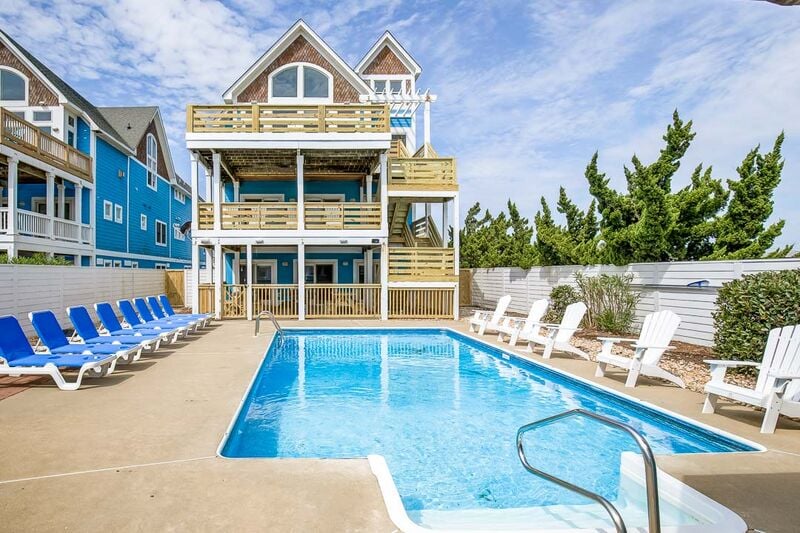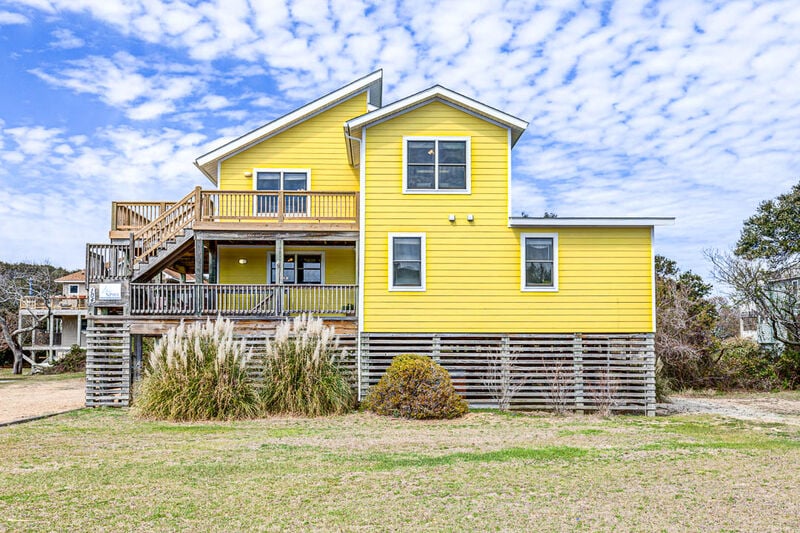Because of my job I am focused on watching what is happening on the Outer Banks. Part of my monitoring of what's going on is I have a Google alert set up to let me know if anything shows up on the internet with "Outer Banks" in it. Over the past month alerts with articles about the shark incidents have been pouring in. On some days I have received over 40 notices of news reports. That's astounding.
For those of us who live here and know that our tourism industry is dependent on our beaches, how do we respond?
 Let me first be clear that 8
Let me first be clear that 8
incidents from sharks did indeed happen on the coast of North Carolina and I do not want to make light of anyone's tragedy.
With that said, most of the media is sensationalizing these incidents. Facts presented on reports are not entirely true thanks to exaggerations and omissions. Most of the mistakes are minor, such as some reporters seem to think the entire North Carolina coast is the Outer Banks, which if you didn't know, this it is not true. Some of the worst mistakes are the exaggerations that include reporters reporting that "the beaches may close" when three of these incidents in fact took place more than 250 miles away in Ocean Isle Beach and Oak Island, North Carolina (286 miles from Kitty Hawk). Do you know what other beach lies, roughly, 286 miles from Kitty Hawk? Atlantic City, New Jersey. Are they reporting this because they fear for public safety? I would like to think so, but I doubt it. In fact, I believe there is another motive.
It comes down to answering one question, "How is a news story viewed as successful?" The answer: how viral is the story? Reporters are measured by how their story spreads. If it doesn't spread then it is not a success. Their success is dependent on your reaction. They have learned over time that nothing spreads more than fear. Why do you think the media reports on more bad news than good news? Bad news has a far greater probability to go viral than good news. And of course they are going to word their article in a way that amplifies your reaction, therefore increasing how viral the story will be.
Am I accusing the media of stretching the truth and exaggerating in order to enhance a story? Absolutely. And in the home I grew up we called that a lie. (Thanks mom and dad.)
Fear and panic equals ratings. It's that simple.
Do you know you're more likely to die by a falling coconut than sharks? You may be thinking, "but I don't live near coconuts." Okay. Here some other things you're more likely to die from (just in the United States): playing high school football, a champagne cork, cows, ants, dog, tornadoes, bees, horses, falling off a ladder, icicle, struck by lightning, etc. The list is rather huge because shark incidents are that small of a number compared to other things.
If they were reporting based on facts the shark incidents wouldn't be in the news, because compared to other events it's not in the top 100 of tragedies happening right now. In fact, shark encounters are one of the rarest form of injury to humans and even rarer for deaths.
Let's look at it this way. Did you know that, on average, 92 people die from car accident in the U.S. every day? That means that depending on where you live you will have anywhere from 1 death per week (Alaska) to 60 deaths per week (Texas). But why isn't this the major news instead of a shark incident? Because we don't care. We've been conditioned to believe car accidents happening on the regular basis is normal. We have also been conditioned to believe that when we are the ones driving we are in control and therefore less susceptible to these statistics; we honestly believe we can bend the odds in our favor. On the other hand, Shark attacks scare us because it isn't something that happens often and we know we have zero control (other than not getting in the water at all).
So what are the real facts? What should the media be telling people? Some media has actually done a good job of reporting the truth, but because their message isn't fear and panic their stories are not going viral. Just like this one probably will not go viral.
For those of us who live here and know that our tourism industry is dependent on our beaches, how do we respond?
 Let me first be clear that 8
Let me first be clear that 8incidents from sharks did indeed happen on the coast of North Carolina and I do not want to make light of anyone's tragedy.
With that said, most of the media is sensationalizing these incidents. Facts presented on reports are not entirely true thanks to exaggerations and omissions. Most of the mistakes are minor, such as some reporters seem to think the entire North Carolina coast is the Outer Banks, which if you didn't know, this it is not true. Some of the worst mistakes are the exaggerations that include reporters reporting that "the beaches may close" when three of these incidents in fact took place more than 250 miles away in Ocean Isle Beach and Oak Island, North Carolina (286 miles from Kitty Hawk). Do you know what other beach lies, roughly, 286 miles from Kitty Hawk? Atlantic City, New Jersey. Are they reporting this because they fear for public safety? I would like to think so, but I doubt it. In fact, I believe there is another motive.
It comes down to answering one question, "How is a news story viewed as successful?" The answer: how viral is the story? Reporters are measured by how their story spreads. If it doesn't spread then it is not a success. Their success is dependent on your reaction. They have learned over time that nothing spreads more than fear. Why do you think the media reports on more bad news than good news? Bad news has a far greater probability to go viral than good news. And of course they are going to word their article in a way that amplifies your reaction, therefore increasing how viral the story will be.
Am I accusing the media of stretching the truth and exaggerating in order to enhance a story? Absolutely. And in the home I grew up we called that a lie. (Thanks mom and dad.)
Fear and panic equals ratings. It's that simple.
Do you know you're more likely to die by a falling coconut than sharks? You may be thinking, "but I don't live near coconuts." Okay. Here some other things you're more likely to die from (just in the United States): playing high school football, a champagne cork, cows, ants, dog, tornadoes, bees, horses, falling off a ladder, icicle, struck by lightning, etc. The list is rather huge because shark incidents are that small of a number compared to other things.
If they were reporting based on facts the shark incidents wouldn't be in the news, because compared to other events it's not in the top 100 of tragedies happening right now. In fact, shark encounters are one of the rarest form of injury to humans and even rarer for deaths.
Let's look at it this way. Did you know that, on average, 92 people die from car accident in the U.S. every day? That means that depending on where you live you will have anywhere from 1 death per week (Alaska) to 60 deaths per week (Texas). But why isn't this the major news instead of a shark incident? Because we don't care. We've been conditioned to believe car accidents happening on the regular basis is normal. We have also been conditioned to believe that when we are the ones driving we are in control and therefore less susceptible to these statistics; we honestly believe we can bend the odds in our favor. On the other hand, Shark attacks scare us because it isn't something that happens often and we know we have zero control (other than not getting in the water at all).
So what are the real facts? What should the media be telling people? Some media has actually done a good job of reporting the truth, but because their message isn't fear and panic their stories are not going viral. Just like this one probably will not go viral.
- The coast of North Carolina is 301 miles long. The Outer Banks is roughly 100 miles of that and is the most northern portion of North Carolina's coast. Roughly 40 of those miles, in Ocracoke Island and Hatteras Island, is where 3 of these incidents occurred. The most northern part of the Outer Banks has not had any of these shark encounters. The northern 60 miles of coast also happens to be where the vast majority of Outer Banks visitors will come visit. This isn't to point out that one portion of the Outer Banks might be safer than another, but it should be noted that not all of the Outer Banks is being impacted.
- These attacks are extremely rare. The North Carolina coast usually sees 1-2 shark incidents per year, which is considered normal. The Outer Banks' last shark attack was in 2011.
- Did you notice the difference between the deaths per week for car accidents in Alaska vs Texas? Did you also notice the state with the smallest amount of deaths was also the state with the smallest population and the state with the greatest amount had the largest population? The Outer Banks hosts as many as 5 million guests annually. That is on top of those who already live here year around. Where there are more people the statistics increase.
- I believe most importantly, the news should be focusing on beach safety, telling people to make sure they're swimming near a life guard. This isn't because of shark incidents. You're more likely to die of a rip current than a shark incident. All beach safety should be observed and it always helpful to draw attention to this. Consult the beach safety guide provided by the Outer Banks Visitors Bureau.
- Lastly, our waters are available to be enjoyed, but if you can't get past the fear Lee Nettles, the Executive Director of the Outer Banks Visitors Bureau, said it best, "Although our area is perhaps best known for its award-winning beaches, as you know, we have an incredibly wide range of attractions, activities and sites. . .Three National Park Service sites, four lighthouses in close proximity, the Outer Banks Scenic Byway, the 78th season of The Lost Colony outdoor drama, museums, parks and galleries, and more than 100 locally-owned restaurants and shops, to name just a few...and, of course, a beach chair at the water's edge is still a pretty great way to spend the day."









